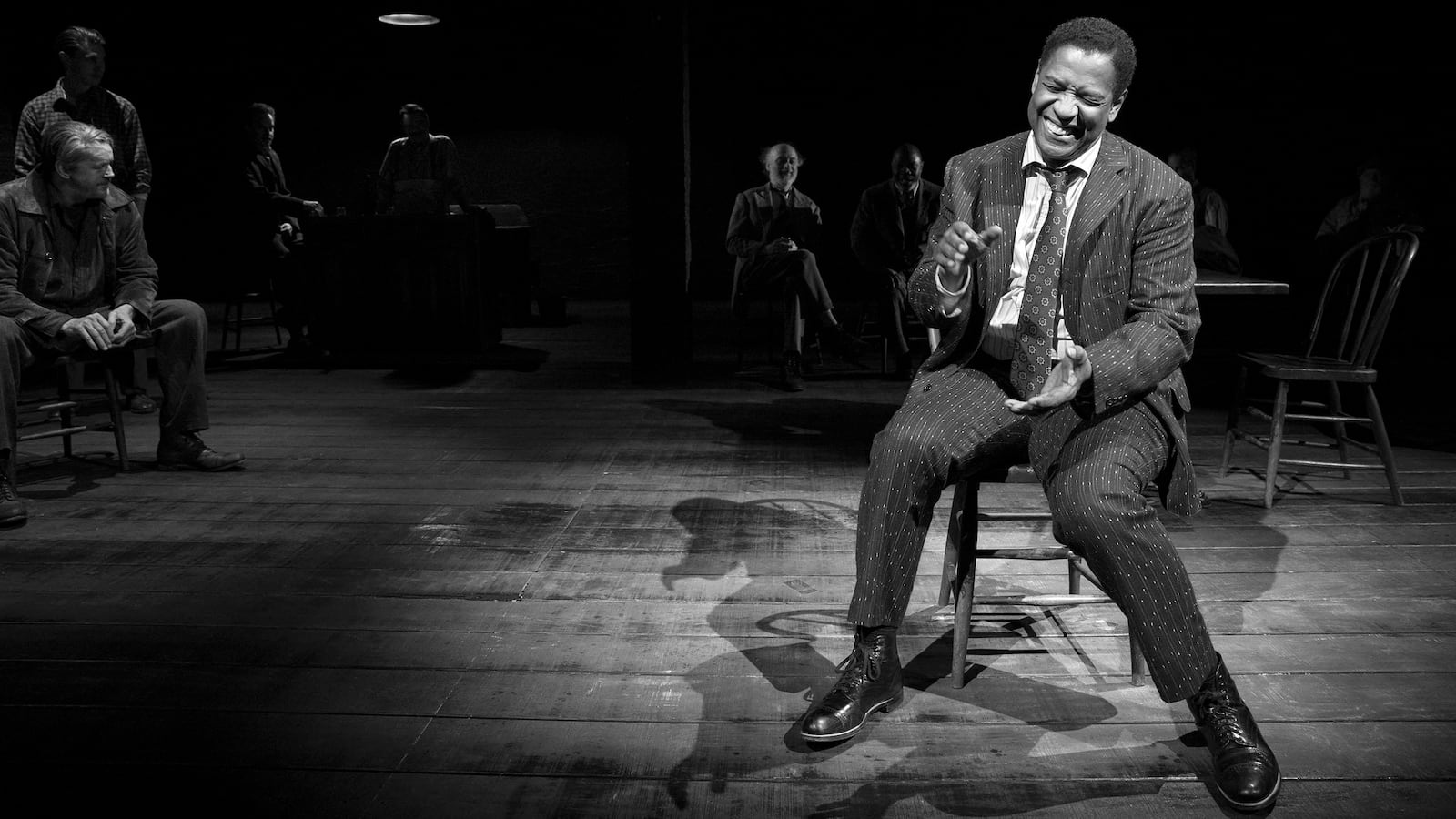As the curtain rises on the new Broadway production of Eugene O’Neill’s The Iceman Cometh, we see a stage full of men in silent, unconscious inebriation; a Hogarthian image frozen beautifully in Jules Fisher and Peggy Eisenhauer’s lighting.
We are in Harry Hope’s (Colm Meaney) bar, just before dawn, one day in 1912, in downtown New York. Harry’s second name is ironic: You may as well abandon hope all ye who enter here.
Santo Loquasto’s brilliant design imagines O’Neill’s description of the bar perfectly: It is dank, dirty, a hovel of a place with rooms above, where two prostitutes board. It is home for all the alienated, damaged characters who have no other homes where they would rather be, or should be.
That is apart from an escapee from the bar, a salesman called Hickey (full name: Theodore Hickman), here played by Denzel Washington (who, among his many awards, won a Tony for his performance in Fences in 2010).
Hickey is set to return to the bar on one of his twice-a-year sorties back to his buddies. Hickey is determined that his apparent success story should inspire the dissolute denizens of Harry’s bar to do the same; to leave this place, put down their glasses, wash their shirts, and succeed.
Some chance. In George C. Wolfe’s production (full disclosure: one of its producers is Barry Diller, chairman of IAC, which owns The Daily Beast), we see all too clearly the paralyzing co-dependency they all have with both the demon drink, and their own inner demons.
The men are as scattered around the stage as their personal stories and backchat. O’Neill’s anguished character studies—flowering randomly into life, clashing into one another—need to be contained and the participants magnified or they become diffuse and make only fleeting impact.
We meet Pat McGloin (Jack McGee), the one-time police lieutenant, Ed Mosher (Bill Irwin), Harry’s brother-in-law, the clowning law student dropout Willie Oban (Neal Huff), and Margie (Nina Grollman), Pearl (Carolyn Braver), and Cora (Tammy Blanchard), three prostitutes who are not given much more to do than squawk their way through nighttime misadventures, and the dismissive misogyny and threats of violence of the men at the bar, particularly Harry.
Joe Mott (Michael Potts), who is black, endures the casual ugly racism of his fellow drinkers, until he can take no more. Somehow, Piet Wetjohn (Dakin Matthews), a leader of a Boer commando unit, and Cecil Lewis (Frank Lewis), a one-time British Army captain (they are known as the General and Captain, respectively) have become best friends.
Until Hickey turns up, O’Neill’s focus is the glowering Larry Slade (David Morse), a former anarchist with “the Movement” who is furious at himself and the world, while his strange, unstable young nemesis Don Parritt (Austin Butler) needles him, wanting to confess something about his mother, who Larry had a relationship with. Larry cringes, and wishes this “stranger” would just turn to dust.
Morse’s fury and unhappiness is always brimful in his dour, affecting performance, with Butler—leech-like and wheedling—on his shoulder. Larry hates where he is, he hates everything around him, and rightly identifies the bar, thus: “It’s the No Chance Saloon. It’s Bedrock Bar, The End of the Line Café, The Bottom of the Sea Rathskeller!...No one here has to worry about where they’re going next, because there is no farther they can go.”
After about an hour of seething and grousing, Hickey is, at least, a breath of fresh air, and Washington’s presence raises audience spirits as he jokes and joshes with his fellow characters.
Washington plays Hickey initially with the just the right amount of over-ingratiation: We know, like Larry, that something isn’t right with him. The outwardly successful Hickey is now an interloper in this dysfunctionally functioning group. He is a responsible member of society, he does stuff during the day, and he has the air of an evangelistic life coach in a snappy suit.
The play is so named for the “iceman” the characters imagine Hickey’s wife Evelyn has been unfaithful with. (The truth is much worse.) There are a lot of portents of grim revelation to come (“I’ve had hell inside me. I can spot it in others,” says Hickey), until Joe smashes a glass and draws a weapon when the racism of his fellow drinkers becomes too much. Potts’ fury is the most bracing moment of the show.
The play drags its twin tracks of promised revelation—what has really happened to Hickey’s wife, what did Parritt really do to his mother—right to the end, like a loaded-down carthorse.
In the performance this critic attended, when Harry shouts at Hickey, now deep in meandering confession, “Get it over, you long-winded bastard!... All we want is to pass out in peace, bejees!” it got both a laugh, and a flutter of applause. One sensed the audience was keen to go.
Washington is our jocular, warmly accessible guide into this Stygian watering hole, but somehow the darker register of Hickey eludes him; Hickey, as the other barflies have noticed, really isn’t all he seems, and Washington’s performance lacks an implication of that, playing against his smooth and easy words—especially when we reach Hickey’s monumental final monologue.
Staging O’Neill’s lyrical density, his existential furies, is tough. In this Broadway production, the carousing and confessions, the lost lives and thwarted ambitions, the sense of a world against you and of you pitted against the world, somehow never pierces as hard as it should. Still, the dank, dark bar on stage feels so real that if you go to an afternoon show you'll drink in every beam of sunlight when you leave.
The Iceman Cometh is at the Bernard B. Jacobs Theatre, 242 West 45th St., New York City. Book here to July 1.




